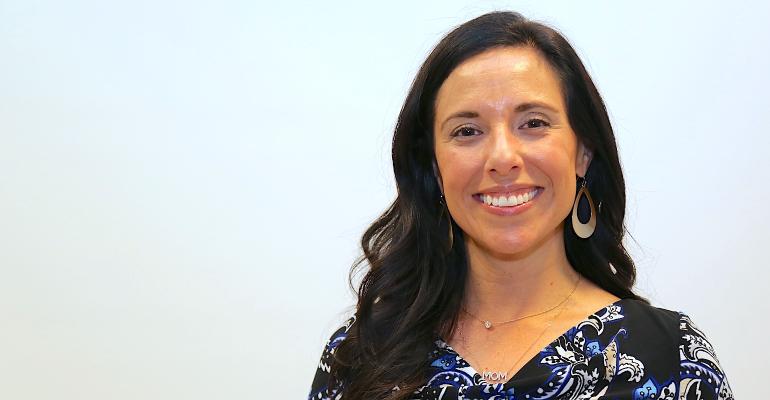Unlocking Latino leadership potential remains crucial for both the workforce and the general economic health in the restaurant industry, the president and CEO of the Latino Leadership Institute told a Multicultural Foodservice and Hospitality Alliance Roundtable earlier this month.
“There are many zigzags,” said Joelle Martinez, leader of the Denver-based institute at the gathering at The Cheesecake Factory Inc. headquarters in Calabasas, Calif. “There are many hills to climb in this work.”
A wide span of diversity, equity, inclusion and belonging topics were addressed during the daylong MFHA Roundtable, and Martinez focused on the Latino potential in the DE&I space, which she said is at a crossroads.
“We stand had a critical juncture for diversity, equity and inclusion in the long term,” Martinez said in her keynote address. “I believe that the way of thinking about DE&I in the past is no longer sustainable.”
More executives must look at the “why” of diversity, equity, inclusion and belonging efforts in their organizations, she said.
“As I sit down with CEO's across sectors and industries,” Martinez related, “they want the solution on a platter.” The reasons for investing in DE&I must identify with market pressures, which are being fueled by more Latinos in the workforce and in the economy in general, she said.
“Destiny is not a matter of chance,” she said. “This stuff is not going to work itself out.” Latinos have been missing from discussions about diversity, equity and inclusion, Martinez said, oftentimes because members of the group have historically assimilated in to the so-called “white” demographic. (When she signed government documents after the birth of her twins, Martinez said she was surprised to learn she had to identify as “white.”)
“In the 1950s and 1960s, when our country was talking about race and equality and fairness and the EEOC [Equal Employment Opportunity Commission], the Latino population in the United States was hovering around 3%,” she said. “We were a pretty small sampling.”
Martinez continued: “As we fast forward, to the 2020 census, we have now become weighty percent of the population. So not only can we no longer be ignored — we are one in five and growing — because by 2050 we will represent one in three Americans.
“We have to put intentionality in focus around specifically the Latino experience around DEI&B not just because it makes me feel good or because it keeps me in a job and because it's going keep our whole economy and workforce going,” she said. Latino spending power in the U.S. economy was near $2.8 trillion in 2020, she said, and Latino gross domestic product grew at about 2.6 times that of non-Latino GDP since 2010, according to a 2022 report.
And workforce has also seen an increase in the number of Hispanic Americans, according to a McKenzie & Co. study published in 2021.
“McKinsey did an excellent study and they looked at the upcoming workforce pipeline,” Martinez said. McKenzie found that 78% of all net new workers entering the workforce in this decade alone are going to be Latino. … Those workers are going be multi-racial, multi-ethnic. … That means within the next five years in our workforce is the entire workforce is going to look different.”
She added that studies indicate the 30 million Latinos in today’s workforce will double to nearly 60 million by 2050.
“All I have to do is look at our public education system, where in most of the major cities Latinos are representing 40% to 65% of all of our public-school population,” Martinez said.
But Martinez cited what she called the “Great Latino Paradox,” adding a condiment popularity reference: “Why is it that Latinos could be literally everywhere – salsa, right we are responsible for salsa — and invisible at the same time?” she asked.
Diversity, equity, inclusion and belonging strategies must be based on not treating Latinos as an homogenous group and celebrating the authenticity of those in the demographic, Martinez said.
“Don't treat Latinos like a monolith,” she said. “We are a mosaic of diversity and experiences. Don't make assumptions. Open up the storytelling.”
Also, organizations need to embrace and celebrate authenticity, Martinez said.
“This is so much easier said than done,” she said. As many as 76% of Latinos in the workplace today after to repress themselves, such as stifling language accents, to get ahead.
“I go back to [late U.S. President] Abraham Lincoln,” Martinez recalled. “He said the best way to predict the future is to actually create it, and I believe all of you in this room have the power, the opportunity and hopefully the will to partner with organizations like us to take this inflection point and actually create a different future for your Latino employees, your future Latino employees and the broader Latino community.”
The MFHA plans similar roundtables Aug. 1 in the Boston area with Inspire Brands and Nov. 9 in Chicago with McDonald’s Corp. Registration is open for those events at a dedicated website.
Contact Ron Ruggless at [email protected]
Follow him on Twitter: @RonRuggless





